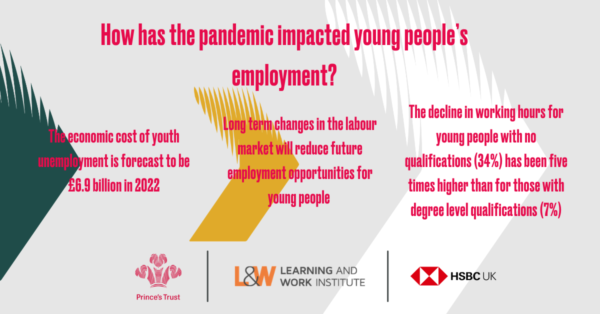The Prince’s Trust, the Learning and Work Institute and HSBC have released their report ‘Facing the Future: Employment prospects for young people after Coronavirus’, you can access the report here. The report found that young people will continue to bear the worst of the unemployment crisis and will reduce UK economic output by around £15 billion before 2025.
Key Findings
- Youth unemployment will remain high even when the economy recovers, with longer-term structural changes in the labour market likely to reduce young people’s future employment opportunities.
- The economic cost of youth unemployment, in terms of lost national output, is forecast to rise to £6.9 billion in 2022
- The fiscal cost of youth unemployment, in the form of lower tax revenue and higher benefit spending, is forecast to be £2.9 billion in 2022
- The long-running scarring cost to young people entering the labour market in 2021, in terms of lost earnings and damage to employment prospects, is forecast to be £14.4 billion over the next seven years
- The report finds disparities in the impact of the crisis on different groups of young people, raising concerns that the pandemic has, and will continue to, exacerbate pre-existing inequalities.
- The decline in working hours for young people with no qualifications (34%) has been five times higher than the decline for those with a degree level qualification (7%).
- Demand for employees with lower-level qualifications is projected to fall in the short, medium and long-term, raising concerns for the employment prospects of young people who lack higher level qualifications
Impact on young people and their employment
This report looks at the impact of Covid-19 on the labour market and says that young people have been hit the hardest; they are over-represented in ‘shutdown’ sectors and as a result are more likely to have been furloughed. This is reflected in a lower number of hours worked.
Drawing on ONS data the report states that two thirds of the total fall in employment since the beginning of the Covid-19 crises has and the unemployment rate for 16-24 year olds remains four times higher than the rest of the workforce.
Young people are at greater risk of unemployment during the pandemic but are also at risk due to the long-term structural changes in the labour market reducing their employment opportunities in the sectors they traditionally work in. These sectors are forecasted to have a slower recovery and lower levels of employment in the longer term. Young people also have limited representation in the sectors that show the strongest jobs growth.
This is also reflected in employer views with 4 in 10 being concerned that the Covid-19 crisis will continue to impact young people’s employment prospects, with those in hospitality and leisure being the most likely to have these concerns.
Some young people fair worse than others
The report expresses growing concerns that pre-existing inequalities will be exacerbated further in the wake of the pandemic:
- The reduction in working hours for young people is 5 times higher for those with no qualifications compared to those with a degree level qualifications.
- The reduction in working hours for black young people (49%) is 3 times higher than those for White young people (16%).
- Young people in London, the South East and the East Midlands have seen the largest drop in hours worked, roughly a 21% decline each compared to only 4% in the North East and 9% in Wales.
- Housing tenure (rent, ownership or private housing) was used as a socio-economic indicator. This showed that young people in rented housing saw a 21% reduction in hours compared to a 14% reduction in private housing.
Recommendations
Protect jobs as we emerge from the pandemic by;
- Ongoing support from the Coronavirus Job Retention Scheme
- Prompt support for furloughed young workers
- Ensure the Restart Scheme provides prompt support for young people who need it most
Delivering a Youth Guarantee for all 16-24 year olds, not just those claiming out of work benefits;
- Ensure that all young people who are unemployed and not in education are able to access a job, an apprenticeship, or an education or training place.
- Support young people to stay on in education
- Expand the eligibility criteria of Kickstart and extend the length of time it is open for
- Increase the amount and extend the length of time the apprenticeship subsidy for under 25s is open for
- Introduce a Job Guarantee to create paid employment opportunities, ring-fenced for young people who have been unemployed for 12 months
- A Youth Employment and Skills Service should be developed to provide high-quality information, advice and guidance to young people
Supporting employment growth for young people;
- Ensure jobs created through the Plan for Jobs and Green Economy spending are ring-fenced for apprenticeships and those out of work
- Introduce a hiring subsidy for employer that take on a young person that has been unemployed for 6 months or more





